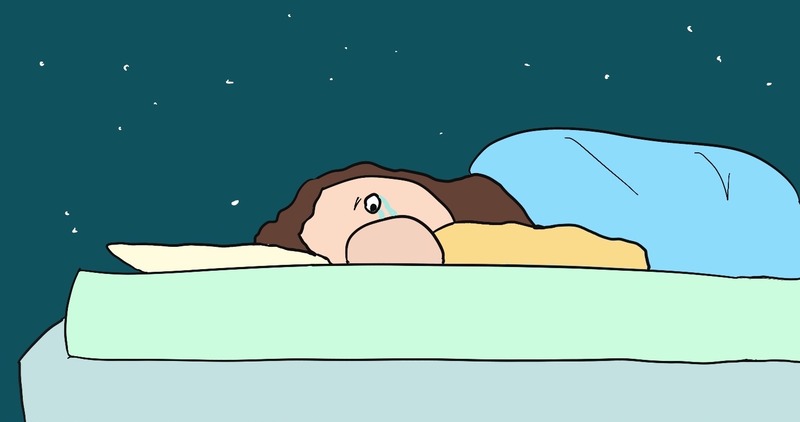
Drawing Motherhood: Four Graphic Memoirists Discuss Their Books on Parenting Life
Rachel Deutsch Talks to Teresa Wong, Becky Barnicoat and Mary Catherine Starr
Rachel Deutsch (The Mother) is in conversation with Teresa Wong (Dear Scarlet, All Our Ordinary Stories), Becky Barnicoat (Cry When the Baby Cries) and Mary Catherine Starr (Mama Needs a Minute!) as the four authors discuss their graphic memoirs on motherhood.
*
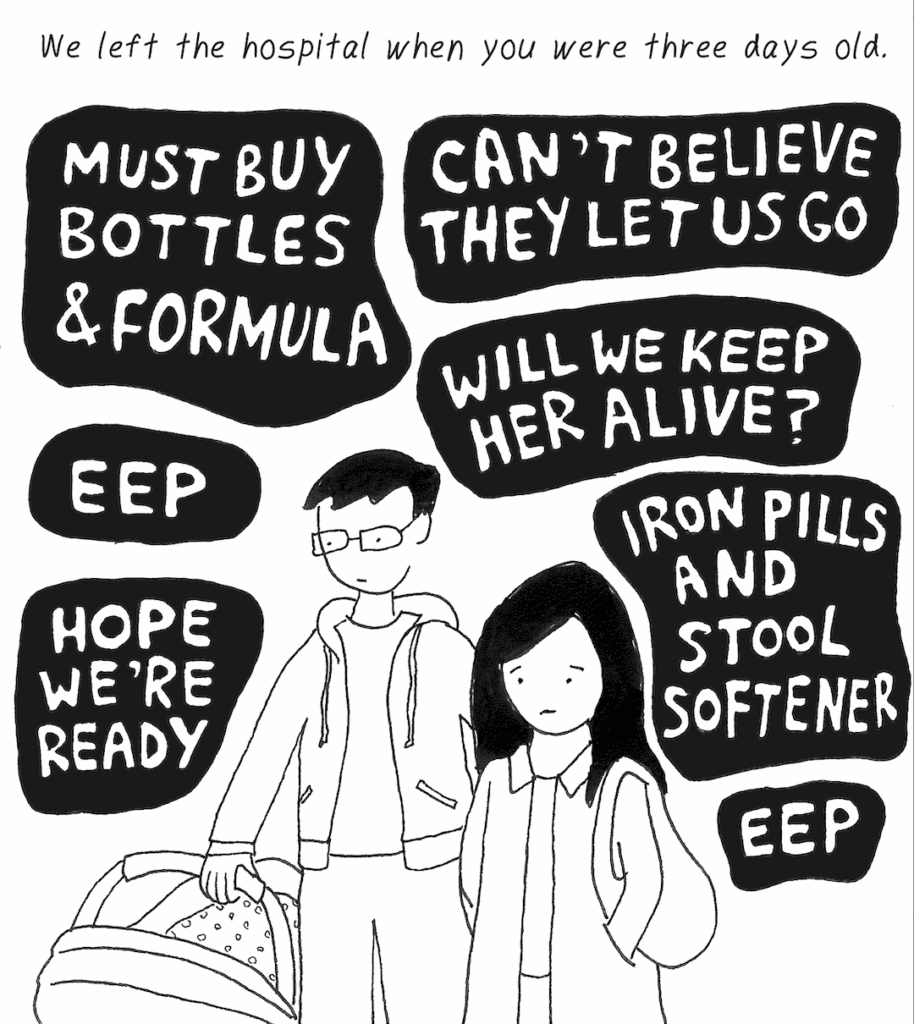 Teresa Wong, “Dear Scarlet”
Teresa Wong, “Dear Scarlet”
How did you get into comics?
Becky Barnicoat: I decided I wanted to be a cartoonist as a small kid. I often wonder why. Is it genetic? My grandad also drew cartoons. It’s always been how I tell my stories. If something funny, interesting or shocking happens, I make a note and later I might draw it. Having a baby was one of the funniest, most interesting and shocking things to happen to me, and so the comics flowed.
Becoming a mother, especially, is like hatching into a new life form and it takes a long time to adjust.
Teresa Wong: That’s really great that having a baby boosted your creativity! For me it was a little different, but ultimately resulted in the same thing: making comics. In my case, postpartum depression was such a silent time, and I really wanted to convey that silence visually. Comics, which is such an immediately legible and visceral medium, helped me show exactly how I felt without having to explain it at length.
Mary Catherine Starr: Yes! I love the way in which you can say so much in an image without having to actually say anything at all. I also love how comics allow me to present tough subjects in an approachable way—I can use illustrations to infuse humor into a serious topic in order to make a point and/or raise awareness. For me, comics have been the perfect vehicle for connecting with other women, especially on the internet; they’re easily shareable and digestible, which means that the messages I convey through my comics (most of which are about motherhood, marriage, feminism, and equality) can reach more people and have more of an impact.
Rachel Deutsch: I also love how approachable comics are. It’s fun and kind of amazing to synthesize something very tough, emotional, or weird into a single image.
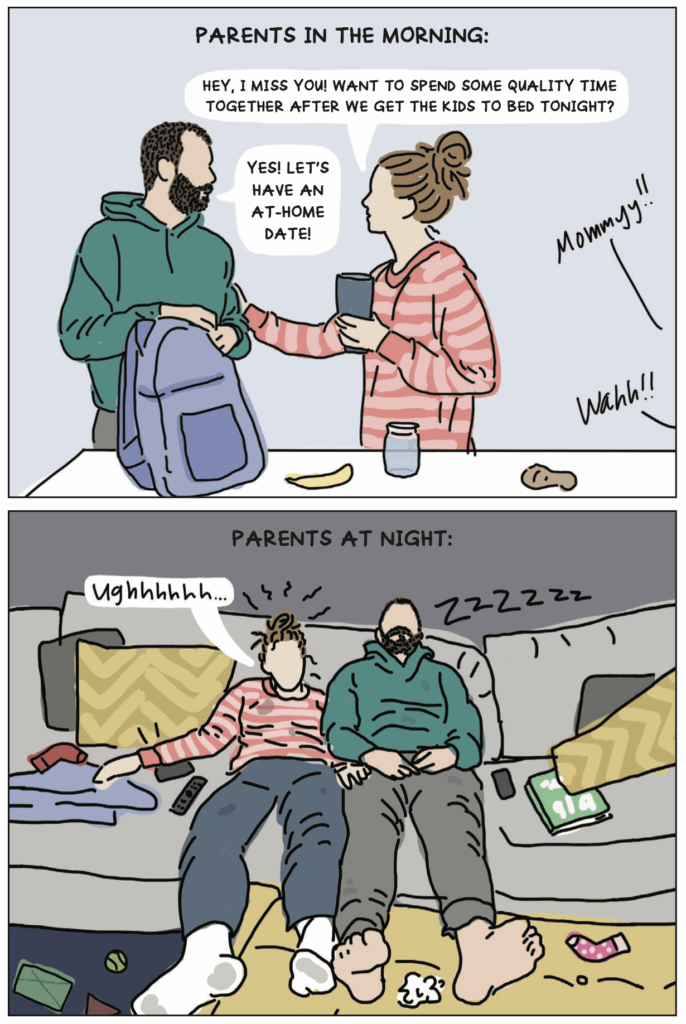 Mary Catherine Starr, “Mama Needs a Minute”
Mary Catherine Starr, “Mama Needs a Minute”
Did motherhood transform you as an artist? How so?
TW: In a way, motherhood turned me into an artist. I had always identified as a writer, but I didn’t think I could draw. When my kids were small, though, they would ask me to draw all kinds of things for them, and I discovered how much I loved doing it. I then made it a goal to get better, and that set me on a path toward drawing my first book, Dear Scarlet, and becoming a cartoonist. If I hadn’t had kids, I’m pretty sure I’d still be fiddling around with the prose version of my second memoir (but first manuscript), All Our Ordinary Stories, and I wouldn’t have found this whole other part of my creative self.
MCS: That is so beautiful, Teresa. Yes, motherhood transformed me as an artist, too—it transformed every aspect of my life! It gave me a new, sharper focus and a newfound mission as an artist. After becoming a mother, I felt a real drive to use my creative energy to share women’s stories and to raise awareness of the challenging parts of motherhood and the way that women and mothers are treated in our society. Art for art’s sake no longer felt as necessary, but art for the greater good and to connect and share with other mothers? That felt urgent. It still does—almost 9 years into motherhood!
BB: It reinvigorated my creativity. Children are a fast-flowing fountain of funny, challenging and weird moments, all great inspiration for stories. I was also fascinated by the extreme transformation of my body during pregnancy and post-partum. As women, our bodies are involved in an ongoing body-horror scenario from puberty to death, and I felt compelled to draw comics about that.
RD: I also felt that motherhood added to my creativity and sharpened my artistic vision .In a way, it’s the perfect narrative. There’s a massive transformation with struggle and pain, and there’s something new and different at the end. I found this incredibly inspiring. After I birthed my children, it felt natural to birth The Mother.
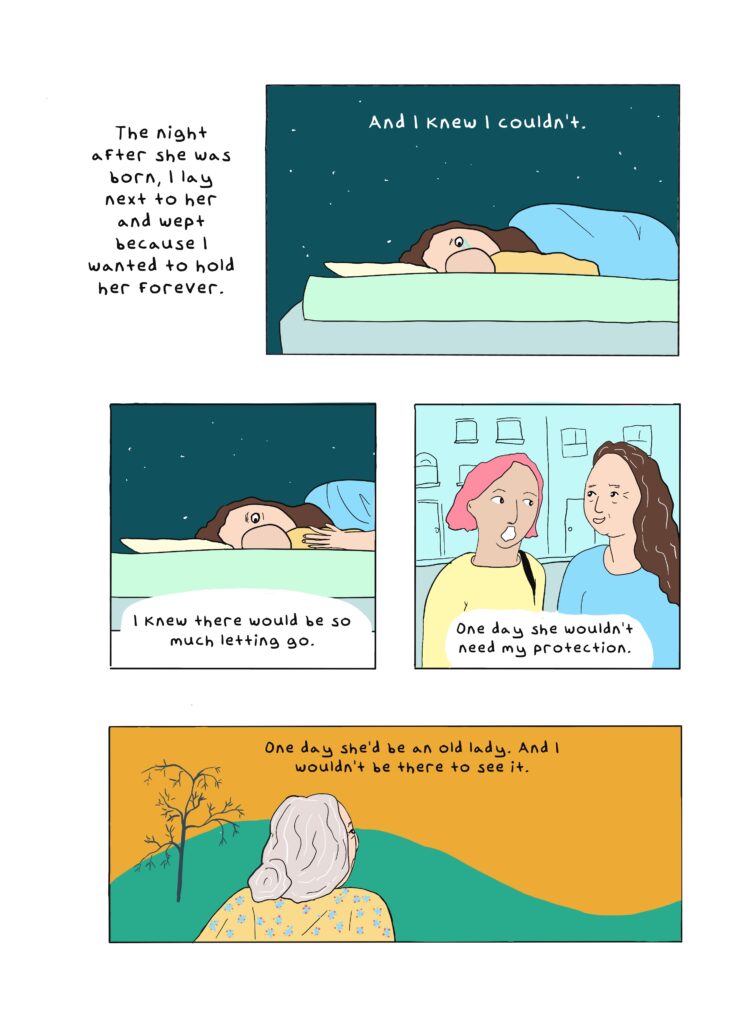 Rachel Deutsch, “The Mother”
Rachel Deutsch, “The Mother”
How did you approach writing about motherhood?
TW: Becoming a mother really changed how I view my own mother, who came to Canada as a sort of mail-order bride and had a baby (me) within a year of her arrival. I write about it a little in Dear Scarlet, how hard that must have been for her to enter wifehood and motherhood while also adjusting to a completely new culture, and how grateful I was to have her support when I became a mom for the first time.
MCS: My book is largely focused on how parenthood changed my relationship with my husband and the balance in our household. I also spend quite a bit of time talking about what it means to be a mom in our society vs. what it means to be a dad in our society and how the expectations for moms vs. dads dictate so much of our experience of motherhood (and fatherhood, of course). In a way, my entire book is a reflection on how motherhood affected my identity and my relationship with my husband. I’m still processing this identity shift and it’s been almost 9 years!
BB: Having a baby is one of the least romantic things that can happen to your relationship. My husband and I went from being a happy couple that never really fought, to constant bickering and competitive tiredness. We didn’t have much family close by, so it was just us cooped up in the house with our newborn, exhausted and shell-shocked. I explore in my book how having a baby massively alters your life as a couple. You transition to new roles, more like colleagues in a job, and you have to get to know each other again. Becoming a mother, especially, is like hatching into a new life form and it takes a long time to adjust.
RD: Even though I knew becoming a mother would change me, I was still shocked at the transition itself. It felt like going through adolescence again. When I came out on the other end, I recognized myself and my old and new parts fell into place. But, while it was happening it was pretty wild and weird. And sometimes sad and scary. I tried to show this in my book through some abstract imagery: animals, snow, dreams of wandering boobs. Relationships changed too. My partner and I fought and tumbled and lost our balance many times. I birthed an entirely new and lifelong relationship with my daughter. I discovered a new relationship with myself and “the mother” emerged. I named my book The Mother in honor of this new, hilarious, wild, loving, and strange new part of myself.
 Becky Barnicoat, “Cry When the Baby Cries”
Becky Barnicoat, “Cry When the Baby Cries”
What was the driving theme in your book?
MCS: My goal was to use my story to answer some bigger picture questions about modern motherhood: Why do so many mothers feel like they’re drowning? Why do so many formerly egalitarian relationships fall into much more traditional gender roles after having kids? How does this happen? Why is mothering SO hard?
RD: Yes! It’s shocking how isolating, unsupported, exhausting and painful becoming a mother and early motherhood can be. I was surprised by how little we talk about this in loud, public ways. I wanted to share this extraordinary experience, including the euphoric joy and self-development, and also hope that it can add to a broader conversation on motherhood.
TW: I agree, Rachel. Nobody really talks about how huge a shift it is to become a mother, and my book also gets at a lot of what you’re saying. But for me, if you were to distill my themes into one line, it’s probably best encapsulated when I quote Leonard Cohen: “There is a crack, a crack in everything / That’s how the light gets in.”
BB: The light definitely gets in! I have experienced moments of such intense joy and love with my kids that it’s left me dizzy. Writing my book was useful because I wrangled this wild life experience into a coherent structure, and it helped me see that parenting is incredibly hard because we’re not meant to parent like this. Nearly all the meltdowns in my family are caused by the same badly thought-through aspects of Western society:
Living atomized lives cut off from family and community.
Parents working long hours.
The tyranny of the clock, and having to be on time for things.
Cars everywhere.
Unfortunately, our society is not really compatible with happy child-rearing. The problem isn’t the kids, but the world we’ve built.
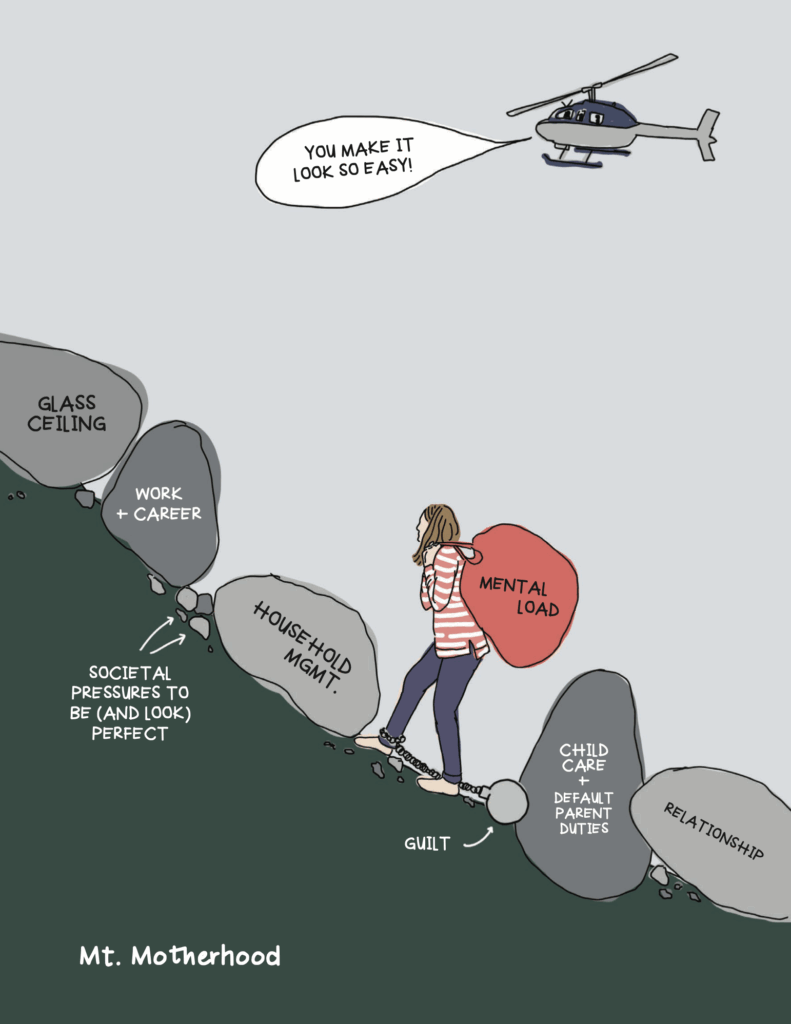 Mary Catherine Starr, “Mama Needs a Minute”
Mary Catherine Starr, “Mama Needs a Minute”
What was it like writing and drawing about something so personal?
MCS: It was cathartic, therapeutic, scary, fun, hard; all of the emotions! But for me, art is personal and comics are personal, so I wouldn’t really know how to do it any other way. I love reading other people’s stories and I think that as women, in particular, sharing the challenging parts of our lives is how we connect with one another and help others feel less alone. That was my ultimate goal with this book.
TW: Same! I didn’t really think about how vulnerable I was being while making the book. What allowed me to write such personal stuff was framing it simply as a letter to my child. And then once the stories were all outside of me in book form, it didn’t feel so personal anymore. Sure, I don’t love people knowing about my hemorrhoids, but if it helps other mothers see themselves reflected on the page, then I’m happy to share.
Parenting often feels just beyond language. It’s very, very hard to describe the joy and the pain of it.
RD: Yes! I felt that too. While I was creating the book, I was in a bit of a happy, creative bubble. I’m still kind of in the process of realizing that I put something so personal out into the world. Memoirs are a snapshot of a period of time in our lives. Life continues afterwards and the stories and relationships continue to grow and change. After my book ended, my life continued and some very difficult things happened. I guess that’s what second books are for!
BB: I’ve definitely had moments of wrestling with the question of whether it’s OK to write and draw very personal things about my family. Is it OK to create comics about my kids? I was afraid I might traumatize them by telling our story or exposing too much. But if mothers can’t tell our stories, then nobody knows what it’s like to be a mother. We are parents behind closed doors, nobody sees us do it. If nobody knows what it’s like to be a parent in a 21st-century individualist society, then we will continue to struggle in isolation.
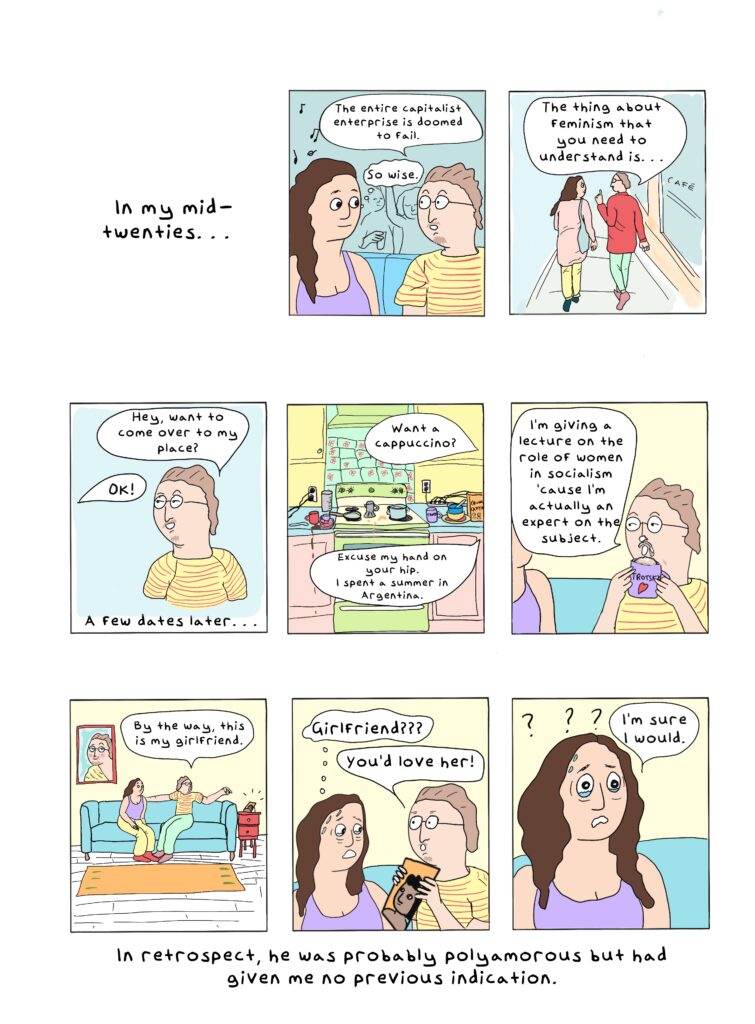 Rachel Deutsch, “The Mother”
Rachel Deutsch, “The Mother”
How did you feel reading each other’s books?
TW: I felt completely validated because I had gone through so many of the same experiences and feelings, even though Rachel, Becky, Mary Catherine, and I come from very different backgrounds. I also had an overwhelming feeling of vindication. My book came out six years ago, and there weren’t as many stories out there about new motherhood and the postpartum experience back then. One Big Five editor rejected Dear Scarlet in 2017, saying he didn’t think women who had been through postpartum depression would be “eager to re-live what they had experienced” in a book. He was wrong, so very wrong. I am super happy to see all these great and nuanced graphic narratives out in the world now.
MCS: Me too! I felt so seen, understood, and held reading Becky’s, Teresa’s, and Rachel’s books. I feel so honored to be in their company and to be making comic/graphic memoirs at a time when so many other talented mothers are doing so and we can navigate this wild experience together. I want more from each of them and can’t wait to see what they do next!
BB: It was incredible. I loved the fact that we had all decided to tell our parenting stories in comics form. It created an instant bond between us. Comics are a niche medium, so you do feel a strong connection to anyone else doing it. Everyone’s books were so moving, and I understood how powerful comics are for conveying complicated emotional experiences. Parenting often feels just beyond language. It’s very, very hard to describe the joy and the pain of it. I cried reading every story. It was cathartic.
RD: It was pretty cool to see Becky, Mary Catherine and Teresa go through this unique process too. I am so in awe of them and it just brings me to tears that we created life and also told our stories through such moving and funny cartoons.
__________________________________
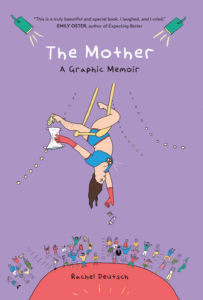
The Mother by Rachel Deutsch is available from Douglas & McIntyre.
Rachel Deutsch
Rachel Deutsch’s writing, cartoons and illustrations have appeared in publications including The New Yorker, PRISM, The Pinch, McSweeney’s, Mother Tongue, Mutha Magazine and in ParentData, the popular newsletter by Emily Oster, the author of Expecting Better. Deutsch is known for bringing honesty and humor to tough parenting moments. She lives in Montreal with her partner and two young kids, and posts regularly on Instagram as @weirdmomart.



















